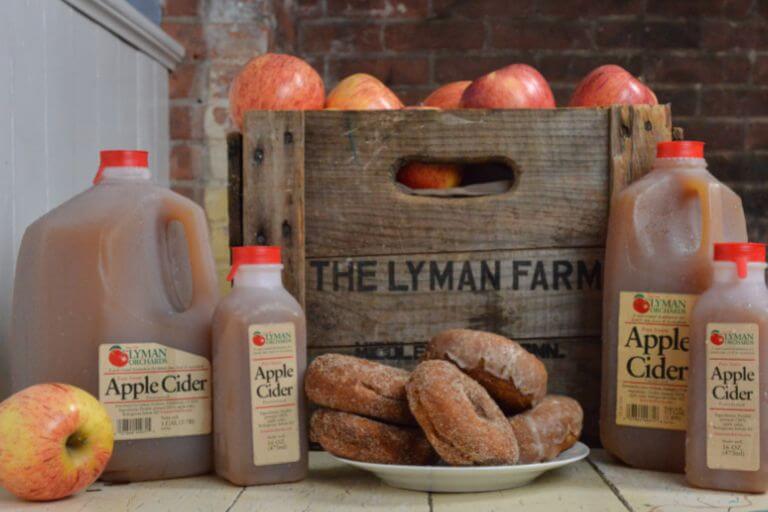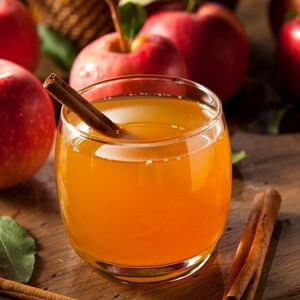Fall is the season of cozy sweaters, apple cider, and the excitement of picking out the perfect pumpkin. Pumpkin picking is more than just a seasonal activity - it's a […]

It doesn't get much better than hand-picking apples at a New England orchard during the fall, except maybe savoring a cup of fresh apple cider. Besides its rich history in Colonial America, apple cider goes a long way in taste, health benefits, and fall traditions.
What's fall without cider? This New England staple is a seasonal favorite-traditionally served throughout apple-picking months, at Halloween, at Thanksgiving, and well into the winter holidays. Apple cider can be enjoyed cold, or heated and mulled-mixed with spices such as cinnamon, nutmeg, and cloves. Whichever way you like it, there's no separating cider from the season!

Cider literally was a staple for early settlers in New England. Just a few years after arriving at Plymouth Rock in 1620, colonists began to plant apple trees. Apples were a good source of food and beverage-the Pilgrims stored the apples and brewed cider to help them through the harsh New England winters. Back then, all cider was "hard" and not the sweet, non-alcoholic version we find in farm markets. Hard cider is created by fermenting pressed apple juice-a process used to preserve the beverage longer.
As history would have it, cider became the most common beverage in New England. This fizzy, fermented version of apple juice was simple to make, kept longer than milk, and safer to drink than water. Early settlers even brewed a low-alcholic version for their children, known as "ciderkin", by steeping their apple mash and pressing it for a second time.
Apple cider and apple juice have one thing in common-they're both beverages made from fresh-squeezed apples.
The key difference between the two-cider is apple juice that hasn't undergone the filtration process of removing particles, pulp or sediment. Apple juice is filtrated to remove solids and then heated to kill bacteria. Some apple ciders, such as Lyman Orchards Apple Cider, are also pasteurized to extend the shelf life. The result-cider is more opaque than apple juice due to apple particles in suspension and is typically tangier than processed apple juice.
Since apple cider isn't filtered, it retains many of the same nutrients as fresh apples and has more polyphenols than apple juice. Polyphenols are antioxidants that can lower the risks for certain health conditions. Here are some of the potential health benefits of apple cider:
Traditional cider is typically made by blending several varieties of apples to give it a balanced taste. McIntosh, Braeburn, and Cortland apples are especially noteworthy for their acidic, tart flavor, while Fuji, Cortland, Gala and Red Delicious apples provide a sweeter taste. Since New England orchards grow multiple varieties, it's possible to create a consistent mix throughtout the year.
The flavor of the cider also reflects the seasons. In September and October the cider tends to be tart as the predominant apples that are squeezed are tarter and have more bite to them. Moving into November and December, the cider is sweeter.
Lyman Orchards Fresh Apple Cider is pasteurized and contains no preservatives. In fact, the ingredient list is as clean as it gets-100% Apple Juice. Lyman Orchards cider is available for purchase at the Apple Barrel Farm Market in gallon, half gallon and pint sizes. In the fall, we offer straight Gala or Honeycrisp blends available in 1/2 gallons. You'll also find freshly-baked apple cider donuts and donut holes in our award-winning bakery! For information on pick-your-own apples, please visit lymanorchards.com/pick-your-own/apples.
Fall is the season of cozy sweaters, apple cider, and the excitement of picking out the perfect pumpkin. Pumpkin picking is more than just a seasonal activity - it's a […]
Get creative and share your carved pumpkin on Facebook or Instagram for a chance to win $150 Gift Card to Lyman Orchards! Carve a pumpkin before October 28, 2024 and […]
Team-building activities are essential for fostering collaboration, improving communication, and boosting morale in any workplace. While there are numerous ways to engage employees, taking your corporate group through a corn […]
32 Reeds Gap Rd
Middlefield, CT 06455
Phone: 860-349-6000
700 Main Street
Middlefield, CT 06455
Phone: 860-349-6031
70 Lyman Road
Middlefield, CT 06455
Phone: 860-349-6033
105 South Street
Middlefield, CT 06455
Phone: 860-349-6015